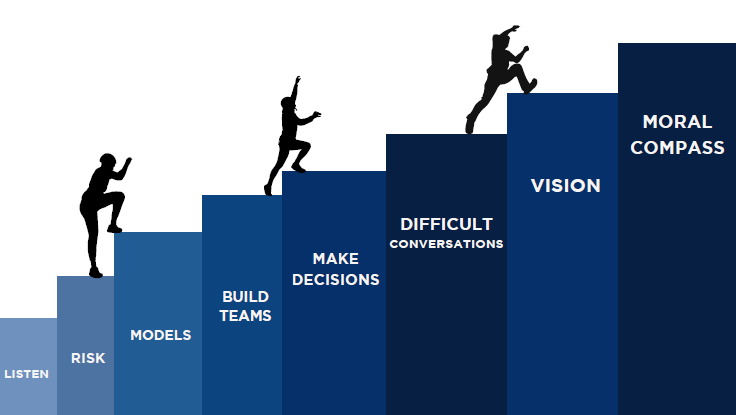Leadership: Do you need a ladder or a compass
On your leadership journey, should you take a ladder or a compass? The answer depends on whether you are trying to build a career or have a fulfilling life.
There is a naive notion that the leadership journey is a straight line to the top and that there is a need to keep climbing the rungs of the ladder. This is something I don’t believe. Hard as it can be to accept, the best way to manage your career is not to feel the pressure to keep climbing and higher in a given time period. Sheryl Sandberg favours the idea of a career “jungle gym’ where people can move up, down or across. In the book “Lean In” she says that ‘true leadership stems from individuality that is honestly and sometimes imperfectly expressed. Leaders should strive for authenticity over perfection.’ Becoming an authentic leader requires building your character and experience.
What I am saying is that leadership is very much about relationships and I believe that truly effective leaders are distinguished by both IQ and EQ. Without ‘emotional intelligence’ a person can have the best training in the world, an analytical mind and an endless supply of smart ideas but won’t necessarily make them a great leader.
So, what do great leaders have in common?
Great leaders remain positive at all times. This is not to say that they live in a ‘sugar coated land of happiness’ but there is a need to maintain a steady ship and remain optimistics whatever challenges you face.
Great leaders remain calm and confident. Brian Tracy says that ‘Leaders think and talk about solutions. Followers think and talk about problems.’
Great leaders listen
In our case, to pupils, staff, parents. They subscribe to undefended leadership. Open themselves up to constructive feedback and reflection. Embrace it and learn from it.
Great leaders are prepared to take risk
Entrepreneurial educators grow as a result of experience and encourage risk taking in others.
Great leaders act as role MODELS.
They lead by example and live in a goldfish bowl. Everything you say and do is noted. Leaders need to walk the talk.
Great leaders BUILD TEAMS which are better than themselves.
They are self-aware and ensure the team compensate for their weaknesses. They are not insecure and continually challenge and develop the skill of the team. Richard Branson says, ‘ I look to hire my weaknesses. Personality before CV. A person who has multiple degrees in your field isn’t always better than someone with broad experience and a wonderful personality may need support to develop. My own team will have heard me state on multiple occasions ‘Appoint for attitude, train for skills’. If someone has the right attitude and are aligned to our values they can after be upskilled in those areas where they need training.
Great leaders take responsibility and ultimately make decisions
Great leaders tackle difficult conversations
Great leaders have a vision and see the bigger picture
Great leaders have their own moral compass and are authentic. The basis of authenticity lies in the values you hold in your ‘true north’.

Source of Article:
This blog post is from Education Matters, Volume 1 – Issue 1, published by AISL Academy, p 38-39.






